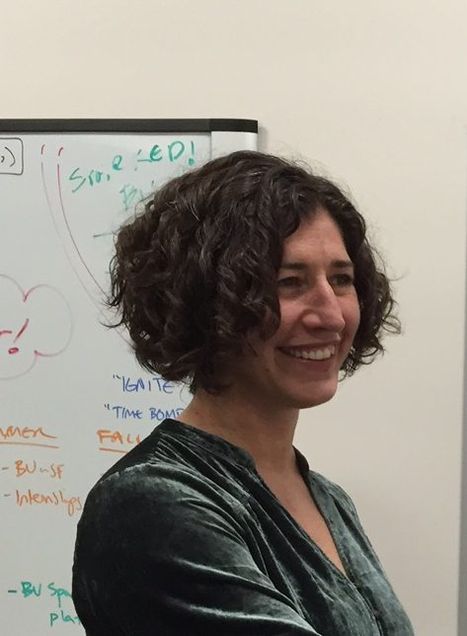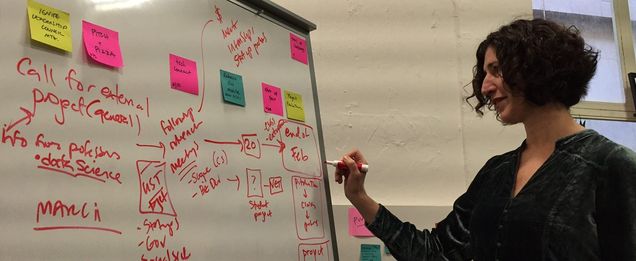Q&A with Ziba Cranmer, Director of BU Spark

Ziba Cranmer joined the Hariri Institute for Computing in December, 2016 as the Director for a newly created initiative, BU Spark. BU Spark is an exciting venture that will create a supportive community for student-centered entrepreneurship in computing as well as a suite of programs, activities, resources, and networks to help and empower students to pursue next-stage development of their ideas, concepts, and creations for innovative computing and data-driven technology.Coming up on her one month anniversary at BU, she shared her insights on where BU Spark is headed and what to look forward to this semester.
Q&A with BU Spark Director, Ziba Cranmer
What is BU Spark?
BU Spark is a new initiative to support student-driven innovation and entrepreneurship. We aim to help students realize their entrepreneurial potential and the endless possibilities that can be achieved through computer science, engineering, and related fields. We plan to do this by providing access to resources, knowledge, and networks that will help students take their projects – or innovation ventures, as we are calling it – to the next level, ideally to launch.
Why is BU Spark! important for computer science students?
An entrepreneurial mindset and skillset are no longer just for people who want to launch a startup. We believe that today’s workforce must be equipped to continuously adapt and adjust to the world around them, whether they are working in large corporations, government agencies, or a startup. These skills will serve them throughout their career and lives. It will increase their resilience and confidence to create their own future, chart their own path.
Is BU Spark only for computer science students?
No, absolutely not! While we hope students from across the university will engage with BU Spark, we are designing our programming to support ventures that are driven by computer science, computer engineering, and related disciplines. What makes BU Spark distinct is that we will place equal emphasis on the feasibility of the proposed technology solution and the viability of the overall venture, and we are fortunate to be able to leverage the resources and expertise of the Hariri Institute for Computing for this purpose.
Although computer science or technology will be a consistent theme throughout BU Spark programming, we know that the most successful teams are multi-disciplinary and reflect the diversity of our world. Additionally, we know that many innovations are designed to solve a problem that may not be technology-related. This means venture teams will need individuals with expertise in the particular domain of the project – from politics to health and entertainment – and will benefit from bringing together diverse team members with the skills necessary to successfully launch a venture; these could be finance majors, advertising majors, artists, storytellers, and so much more.
We hope to collaborate with colleges and departments across the university – from Questrom to the College of Fine Arts – to build a cross-disciplinary approach to innovation ventures.
What are your plans for this semester?
We are excited to host Rebecca Norlander as our first “BU Spark Entrepreneur in Residence” this semester. Rebecca, a BU computer science alumna, worked at Microsoft for almost 20 years and started and recently sold her own company. She will be hosting three sessions for students on topics relevant to tech-driven entrepreneurship over the course of the semester.
We are also working with the Computer Science Department to source real-world projects that students can complete as part of their course requirements. This will give students a chance to really understand and solve problems in the context of actual customers, which is a critical entrepreneurial skill.
And, we are laying the groundwork for a program in which a select number of students with promising projects can spend the summer as a paid “Spark in Residence” intern and access a range of support that will progress both the technology and the entrepreneurship components of their venture. We have many more ideas in the hopper, but they are too early to share!
 What are the biggest challenges facing students with an idea?
What are the biggest challenges facing students with an idea?
From what I’ve seen in the short time I’ve been at BU, there is no shortage of ideas among the student population, especially those in computer science. Solving problems and creating solutions is in their DNA, which you see at every hackathon these students attend, generating endless possibilities.
Students have told me that they have quite a few half-finished projects in their computers – or githubs – but they lack the incentive, time, and structure to take them to completion. I have also been told that they are not sure what to do if they do have a finished product – how to get it in the hands of potential customers or users, etc. These students are highly self-sufficient, and if given the tools and knowledge to bring their innovations to life, I am confident they will achieve success.
We have identified a series of core skills and knowledge areas we believe will help students be successful. All of our programming will seek to deliver one or more of these skills, ultimately providing a holistic set of entrepreneurship toolbox.
Tell us a little about yourself, what makes you excited to lead this new initiative at BU?
I am energized by helping entrepreneurs and innovators. This has been a common theme throughout my career, whether it was helping “intrapreneurs” at Nike or helping public sector innovators address some of the world’s most pressing problems. I always seem to find myself among these people. I am particularly excited to be working with computer science students who, at their core, are problem solvers – that is incredibly energizing.
How do you see BU Spark growing and evolving?
We are going to be experimenting with a lot of programs to see what resonates with students and helps them advance their projects to the next level. Initially, I believe we will focus on giving as many students as possible opportunities to explore entrepreneurship. Once we start to find students with concrete ideas – and they start to find us – we will work to secure support relevant to those individuals with more advanced projects. I am also excited about finding ways to engage alumni, particularly those in the innovation and entpreneurship space. We want them to share their stories, their time, and their talent in support of student projects. As with any start-up venture, I expect we will be continuously adapting and iterating our approach!
For questions about BU Spark, contact Ziba at zcranmer@bu.edu.